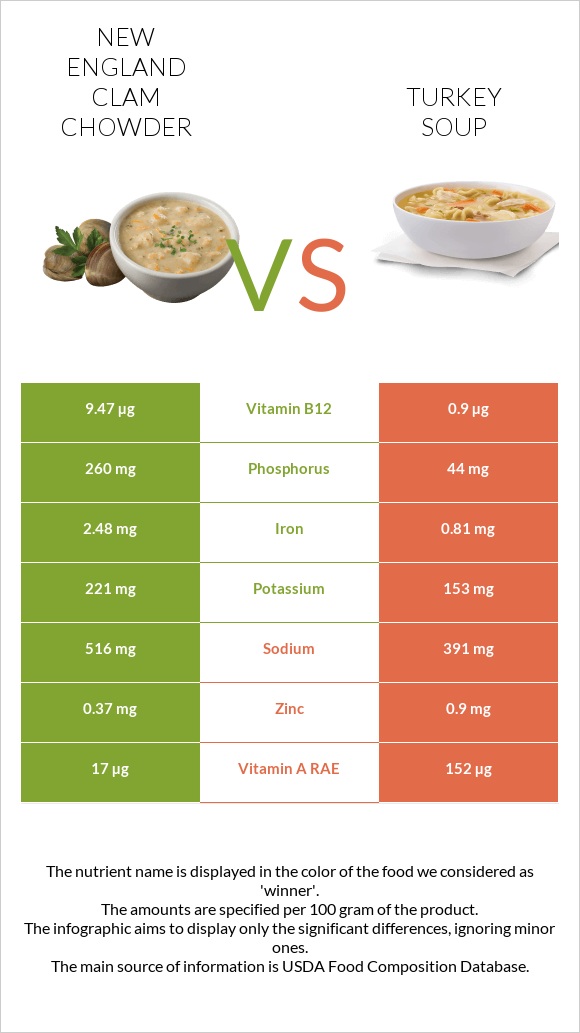New England Clam Chowder vs. Turkey soup — In-Depth Nutrition Comparison
Compare
The main differences between new England Clam Chowder and turkey soup
- New England Clam Chowder has more vitamin B12, phosphorus, iron, copper, vitamin B2, and vitamin B1; however, turkey soup has more vitamin A.
- Daily need coverage for vitamin B12 for new England Clam Chowder is 357% higher.
- Turkey soup has 8 times less vitamin B1 than new England Clam Chowder. New England Clam Chowder has 0.125mg of vitamin B1, while turkey soup has 0.015mg.
- Turkey soup is lower in sodium.
Food types used in this article are Soup, clam chowder, new england, canned, condensed and Soup, turkey, chunky, canned, ready-to-serve.
Infographic

Infographic link
Mineral Comparison
Mineral comparison score is based on the number of minerals by which one or the other food is richer. The "coverage" charts below show how much of the daily needs can be covered by 300 grams of the food.
| Contains more MagnesiumMagnesium | +30% |
| Contains more PotassiumPotassium | +44.4% |
| Contains more IronIron | +206.2% |
| Contains more CopperCopper | +139% |
| Contains more PhosphorusPhosphorus | +490.9% |
| Contains more ManganeseManganese | +65% |
| Contains more SeleniumSelenium | +∞% |
| Contains more CalciumCalcium | +31.3% |
| Contains more ZincZinc | +143.2% |
| Contains less SodiumSodium | -24.2% |
Vitamin Comparison
Vitamin comparison score is based on the number of vitamins by which one or the other food is richer. The "coverage" charts below show how much of the daily needs can be covered by 300 grams of the food.
| Contains more Vitamin CVitamin C | +51.9% |
| Contains more Vitamin EVitamin E | +∞% |
| Contains more Vitamin B1Vitamin B1 | +733.3% |
| Contains more Vitamin B2Vitamin B2 | +266.7% |
| Contains more Vitamin B12Vitamin B12 | +952.2% |
| Contains more Vitamin KVitamin K | +∞% |
| Contains more FolateFolate | +180% |
| Contains more Vitamin AVitamin A | +794.1% |
| Contains more Vitamin B5Vitamin B5 | +68.8% |
| Contains more Vitamin B6Vitamin B6 | +25% |
All nutrients comparison - raw data values
| Nutrient |  |
 |
DV% diff. |
| Vitamin B12 | 9.47µg | 0.9µg | 357% |
| Phosphorus | 260mg | 44mg | 31% |
| Iron | 2.48mg | 0.81mg | 21% |
| Copper | 0.239mg | 0.1mg | 15% |
| Vitamin A | 17µg | 152µg | 15% |
| Selenium | 6.3µg | 11% | |
| Vitamin B1 | 0.125mg | 0.015mg | 9% |
| Vitamin B2 | 0.165mg | 0.045mg | 9% |
| Zinc | 0.37mg | 0.9mg | 5% |
| Sodium | 516mg | 391mg | 5% |
| Fiber | 0.7g | 3% | |
| Vitamin E | 0.42mg | 3% | |
| Manganese | 0.165mg | 0.1mg | 3% |
| Vitamin B5 | 0.231mg | 0.39mg | 3% |
| Polyunsaturated fat | 0.959g | 0.46g | 3% |
| Protein | 3.17g | 4.33g | 2% |
| Vitamin C | 4.1mg | 2.7mg | 2% |
| Potassium | 221mg | 153mg | 2% |
| Vitamin B6 | 0.104mg | 0.13mg | 2% |
| Folate | 14µg | 5µg | 2% |
| Saturated fat | 0.959g | 0.52g | 2% |
| Monounsaturated fat | 0g | 0.75g | 2% |
| Calories | 72kcal | 57kcal | 1% |
| Carbs | 10.32g | 5.96g | 1% |
| Cholesterol | 6mg | 4mg | 1% |
| Magnesium | 13mg | 10mg | 1% |
| Calcium | 16mg | 21mg | 1% |
| Vitamin K | 0.8µg | 1% | |
| Choline | 6.9mg | 1% | |
| Fats | 2.06g | 1.87g | 0% |
| Net carbs | 9.62g | 5.96g | N/A |
| Sugar | 0.38g | N/A | |
| Vitamin B3 | 1.55mg | 1.52mg | 0% |
| Trans fat | 0.013g | N/A | |
| Tryptophan | 0.042mg | 0% | |
| Threonine | 0.171mg | 0% | |
| Isoleucine | 0.218mg | 0% | |
| Leucine | 0.331mg | 0% | |
| Lysine | 0.343mg | 0% | |
| Methionine | 0.091mg | 0% | |
| Phenylalanine | 0.177mg | 0% | |
| Valine | 0.234mg | 0% | |
| Histidine | 0.101mg | 0% | |
| Omega-3 - EPA | 0.01g | N/A | |
| Omega-3 - DHA | 0.011g | N/A | |
| Omega-3 - DPA | 0.008g | N/A |
Macronutrient Comparison
Macronutrient breakdown side-by-side comparison
Protein:
3.17 g
Fats:
2.06 g
Carbs:
10.32 g
Water:
81.49 g
Other:
2.96 g
Protein:
4.33 g
Fats:
1.87 g
Carbs:
5.96 g
Water:
86.37 g
Other:
1.47 g
| Contains more CarbsCarbs | +73.2% |
| Contains more OtherOther | +101.4% |
| Contains more ProteinProtein | +36.6% |
~equal in
Fats
~1.87g
~equal in
Water
~86.37g
Fat Type Comparison
Fat type breakdown side-by-side comparison
Saturated fat:
Sat. Fat
0.959 g
Monounsaturated fat:
Mono. Fat
0 g
Polyunsaturated fat:
Poly. Fat
0.959 g
Saturated fat:
Sat. Fat
0.52 g
Monounsaturated fat:
Mono. Fat
0.75 g
Polyunsaturated fat:
Poly. Fat
0.46 g
| Contains more Poly. FatPolyunsaturated fat | +108.5% |
| Contains less Sat. FatSaturated fat | -45.8% |
| Contains more Mono. FatMonounsaturated fat | +∞% |




